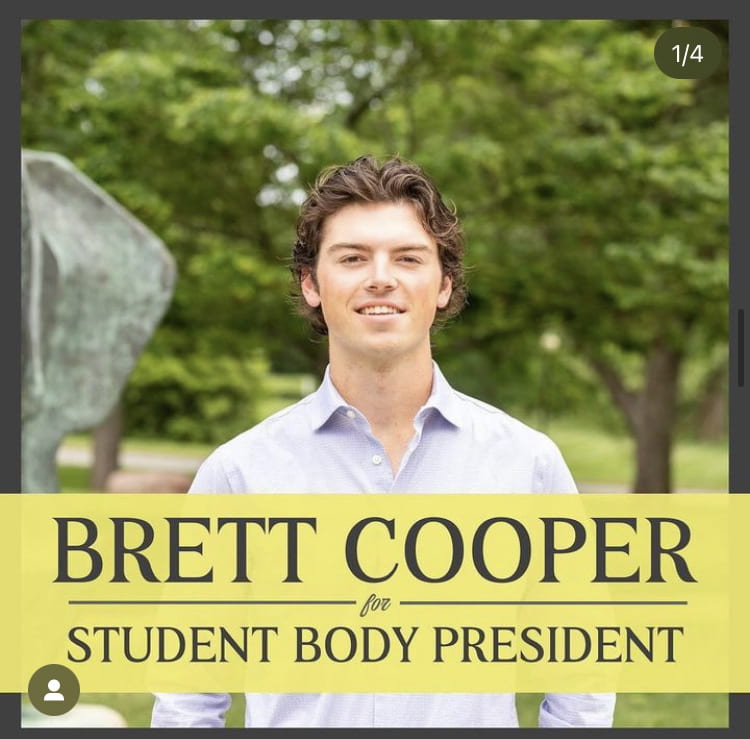by Sarah Nipper
The SGA Elections have officially begun following the Spring Election Debate. Serving as the only uniform setting for candidates to campaign, the SGA Debate is essential for learning about candidates’ values and responses to campus concerns. In case you missed it, here are the highlights. (Since the positions other than President are running unopposed, their responses are not mentioned here.)




The debate started with an opportunity for candidates to introduce their campaigns with an opening statement:
- Caroline Koenig is a sophomore who serves as Student Affairs co-chair on SGA this year. Her platforms are tradition, investment, mental wellbeing, and efficiency. She plans to invest in a budget to fund capital projects and make SGA scholarships, bolster traditions and make them more successful, ensure that mental wellbeing is a priority with accessible counseling hours, and advocate for fair and appropriate housing.
- Sophia Koppensteiner is a sophomore who serves as Dining Chair on SGA this year. Her platforms are community involvement, wellbeing, and sustainability. She plans to create more events showcasing expression and identity, increase accessibility to counseling, encourage collaboration between different campus groups, promote the expression of identity and interests, and advocate for change by bridging the gap between students and administration.
- Brett Cooper is a sophomore who serves as Finance Chair on SGA this year. His platforms are service, impact, and responsibility. He plans to further service by supporting groups like the After School Program and local Danville organizations. He plans to maximize the impact of SGA’s budget with his experience as finance chair. He states that his campaign is for everyone and he will make sure student needs are met and students feel supported and valued.
- Kasey Montgomery is a junior and served as Culture Chair on SGA this year. Her platforms are community and care. She stresses the importance of community and how care can cultivate it. She advocates for inclusive and equitable communities that integrate with Danville.
GENERAL QUESTIONS:
DEI is under attack across the state, and it is important now more than ever that SGA shows its support and engagement for and with DEI initiatives. How do you see your role as contributing to that, and what are examples of things you might like to accomplish in your role?
Kasey: plans for SGA to offer more opportunities for students to get involved in social and political issues
Brett: plans to continue to support and empower the work of affinity groups
Sophia: plans to stress importance of writing campaigns and listen to student concerns and viewpoints
Caroline: wants Chair of Finance and Chair Student Affairs to meet individually with members of DEI groups on campus to ensure maximization of support
It is important that students feel seen and represented by SGA. How does your experience in SGA (or SAC) make you the right person for the role? And, outside of SGA, how have you personally connected with the student body?
Kasey: discussed her growth and how she has fallen in love with campus involvement; wants to make SGA more directly involved with students
Brett: recounted personal experience dealing with death of golf coach and experiencing Centre’s support; wants to give back to the community
Sophia: stressed importance of students feeling seen; noted her experience as dining chair as essential to learning to listen to student voices
Caroline: described herself as a “social butterfly;” mentions importance of listening to students in their everyday conversations to learn about real problems
CANDIDATE SPECIFIC QUESTIONS:
Brett: Your experience in SGA, and your platforms, are largely centered around your experience as finance chair. What, exactly, does fiscal responsibility mean in the context of SGA? What does fiscal responsibility mean for affinity groups in particular or giving back to the community?
- “Fiscal responsibility means using all of SGA’s allocated funds”
- wants to maximize budget
- understands inner working of SGA finance
- wants to use experience to fund community events in a responsible way
Kasey: A component of your platform “Care” is enhancing activism and engagement with political issues on campus. Could you speak on why these things are important to our campus culture? How do you plan to accomplish them?
- “Our community thrives when we are sure and abundantly clear that each and every one of us belongs”
- mentions business of Centre students’ routines and details plan to integrate activism and engagement in daily lives
Caroline: Many ideas in your platform require the collaboration with, willingness, or resources of other offices and departments on campus – for example, expanding counseling hours would involve the cooperation of the College’s professional staff. How do you respond to these roadblocks, and how do you view the role and efficiency of students in these positions?
- “The service and commitment we provide is to be that connection and mediate”
- wants to meet with faculty and administration, negotiate and address issues
Sophia: In your platform, you propose that mental health resources can bridge the gap between administration and the student body. To you, is there a connection between these two issues? Could you speak on why you have chosen to combine these elements within your platform, rather than tackling them as separate issues?
- “Mental health goes perfectly in hand with the health of our community”
- wants to bridge the gap in accessibility of mental health services
AUDIENCE QUESTION
What plans do you have to better the lives of people with mental and physical disabilities?
Brett: wants to amplify the voices of those with disabilities, wants better dorm accommodations for disabled access
Kasey: emphasized need for more listening sessions and importance of SGA to ingrain considerations of people with disabilities into every conversation and initiative
Caroline: wants disabled representation within Centre departments (Title IX, counseling, tutoring) so that students can better trust those they confide in
Sophia: wants to improve on what Centre has to support disabled students and advocate for better wheelchair access on campus.
SGA voting is now open. We hope this helps you make an informed decision – your vote counts!

